Singh R. Introduction to Basic Manufacturing Processes and Workshop Technology
Подождите немного. Документ загружается.

328 Introduction to Basic Manufacturing Processes and Workshop Technology
smoke, fumes and gases, excessive shock or vibrations, steam and corrosive
atmosphere, etc.
32. One should not work on the wiring of an arc welding machine unless qualified to
do so.
33. Welding equipment used in the open and shall be protected from weather conditions.
If it has been wetted it shall be thoroughly dried before being used.
34. Proper terminals should be used on the arc welding machines for the power line
voltage connection.
35. Neither terminal of the welding generator shall be bonded to the frame of the
welding machine.
36. Periodically clear out the accumulated dust from the welding machine with suction
cleaner as this will not blow dust into other parts of the machine.
37. Over greasing may foul the commutators of DC generator.
38. Check and, if necessary, clean commutators of DC generator periodically, using fine
sand paper.
39. Excessive sparking may result in a worn commutator of DC generator which may
be cured by skimming in a lathe.
40. Brushes should move freely and have adequate spring tension. This can be tested
by lifting and releasing them. Brushes should snap be firmly against the commutator
of DC generator.
41. Greasing points need attention periodically.
42. Switch contacts should be cleaned periodically.
17.7 RESISTANCE WELDING
In resistance welding the metal parts to be joined are heated by their resistance to the flow
of an electrical current. Usually this is the only source of heat, but a few of the welding
operations combine resistance heating with arc heating, and possibly with combustion of
metal in the arc. The process applies to practically all metals and most combinations of pure
metals and those alloys, which have only a limited plastic range, are welded by heating the
parts to fusion (melting). Some alloys, however, may welded without fusion; instead, the parts
are heated to a plastic state at which the applied pressure causes their crystalline structures
to grow together. The welding of dissimilar metals may be accomplished by melting both
metals frequently only the metal with the lower melting point is melted, and an alloy bond
is formed at the surface of the unmelted metal.
In resistance welding processes no fluxes are employed, the filler metal is rarely used
and the joints are usually of the lap type. The amount of heat generated in the workpiece
depend on the following factors:
(1) Magnitude of the current,
(2) Resistance of the current conducting path, and
Mathematically, H = IVt
= I(IR)t
= I
2
Rt
Welding 329
Where H = heat generated in joules
I = current in Amp.
R = resistance in ohms
t = time of current flow in seconds.
17.7.1 Types of Resistance welding
The major types of resistance welding are given as under:
(1) Spot Welding
(2) Seam Welding
(3) Projection Welding
(4) Resistance Butt Welding
(5) Flash Butt Welding
(6) Percussion Welding
(7) High Frequency Resistance Welding
(8) High Frequency Induction Welding
Some of the above important welding processes are discussed as under,
17.7.1.1 Spot Welding
In this process overlapping sheets are joined by local fusion at one or more spots, by the
concentration of current flowing between two electrodes. This is the most widely used resistance
welding process. A typical resistance spot welding machine is shown in Fig. 17.23. It essentially
consists of two electrodes, out of which one is fixed. The other electrode is fixed to a rocker
arm (to provide mechanical advantage) for transmitting the mechanical force from a pneumatic
cylinder. This is the simplest type of arrangement. The other possibility is that of a pneumatic
or hydraulic cylinder being directly connected to the electrode without any rocker arm. For
welding large assemblies such as car bodies, portable spot welding machines are used. Here
the electrode holders and the pneumatic pressurizing system are present in the form of a
portable assembly which is taken to the place, where the spot is to be made. The electric
current, compressed air and the cooling water needed for the electrodes is supplied through
cables and hoses from the main welding machine to the portable unit. In spot welding, a
satisfactory weld is obtained when a proper current density is maintained. The current
density depends on the contact area between the electrode and the work-piece. With the
continuous use, if the tip becomes upset and- the contact area increases, the current density
will be lowered and consequently the weld is obtained over a large area. This would not be able
to melt the metal and hence there would be no proper fusion. A resistance welding schedule
is the sequence of events that normally take place in each of the welds. The events are:
1. The squeeze time is the time required for the electrodes to align and clamp the two
work-pieces together under them and provide the necessary electrical contact.
2. The weld time is the time of the current flow through the work-pieces till they are
heated to the melting temperature.
3. The hold time is the time when the pressure is to be maintained on the molten
metal without the electric current. During this time, the pieces are expected to be
forged welded.
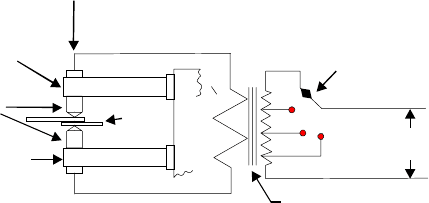
330 Introduction to Basic Manufacturing Processes and Workshop Technology
4. The off time is time during which, the pressure on the electrode is taken off so that
the plates can be positioned for the next spot.
Movable arm
Fixed arm
Pressure
Frame
Job
Re
g
ulator
Throu
g
h contact
to AC current suppl
y
Transformer
Water-cooled
electrode
Fig. 17.23 Resistance spot welding machine setup
Before spot welding one must make sure that
(i) The job is clean, i.e., free from grease, dirt, paint, scale, oxide etc.
(ii) Electrode tip surface is clean, since it has to conduct the current into the work with
as little loss as possible. Very fine emery cloth may be used for routine cleaning.
(iii) Water is running through the electrodes in order to
(a) Avoid them from getting overheated and thus damaged,
(b) Cool the weld.
(iv) Proper welding current has been set on the current selector switch.
(v) Proper time has been set on the weld-timer.
Spot welding electrodes
Spot welding electrodes are made of materials which have
(1) Higher electrical and thermal resistivities, and
(2) Sufficient strength to withstand high pressure at elevated temperatures.
Copper base alloys such as copper beryllium and copper tungsten are commonly used
materials for spot welding electrodes. For achieving the desired current density, It is important
to have proper electrode shape for which three main types of spot welding electrodes are used
which are pointed, domed and flat electrodes.
Applications of Spot Welding
(i) It has applications in automobile and aircraft industries
(ii) The attachment of braces, brackets, pads or clips to formed sheet-metal parts such
as cases, covers or trays is another application of spot welding.
(iii) Spot welding of two 12.5 mm thick steel plates has been done satisfactorily as a
replacement for riveting.
(iv) Many assemblies of two or more sheet metal stampings that do not require gas tight
or liquid tight joints can be more economically joined by spot welding than by
mechanical methods.
(v) Containers and boxes frequently are spot welded.
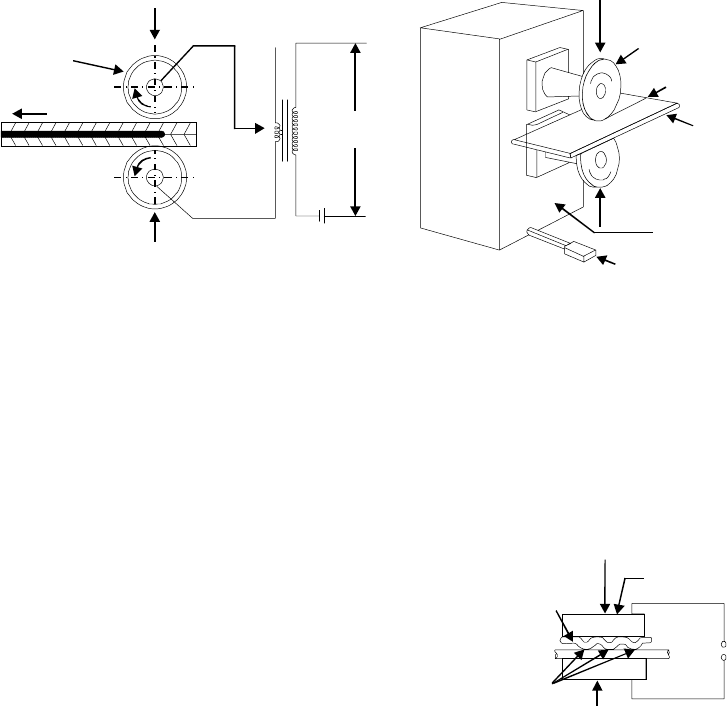
Welding 331
17.7.1.2 Resistance Seam Welding
It is a continuous type of spot welding wherein spot welds overlap each other to the desired
extent. In this process coalescence at the faying surfaces is produced by the heat obtained from
the resistance to electric current (flow) through the work pieces held together under pressure
by circular electrodes. The resulting weld is a series of overlapping resistance-spots welds made
progressively along a joint by rotating the circular electrodes. The principle of seam welding is
shown in Fig. 17.24(a) and resistance seam welding process set up is shown in Fig. 17.24(b). The
seam welding is similar to spot welding, except that circular rolling electrodes are used to
produce a continuous air-tight seam of overlapping welds. Overlapping continuous spot welds
seams are produced by the rotating electrodes and a regularly interrupted current.
Force
Wheel
electrode
A.C.
power
Contactor
Force
Motor driven
Wheel electrode
Weld
Workpiece
Weldin
g
transformer
and controls
Foot switch
Fig. 17.24 (a) Principle of seam welding process Fig. 17.24 (b) Resistance seam welding process setup
Applications
1. It is used for making leak proof joints in fuel tanks of automobiles.
2. Except for copper and high copper alloys, most other metals can be seam welded.
3. It is also used for making flange welds for use in watertight tanks.
17.7.1.3 Resistance Projection Welding
Fig.17.25 shows the projection welding.
This process is a resistance welding process in
which two or more than two spot welds are
made simultaneously by making raised portions
or projections on predetermined locations on
one of the workpiece. These projections act to
localize the heat of the welding circuit. The
pieces to be welded are held in position under
pressure being maintained by electrodes. The
projected contact spot for welding should be
approximately equal to the weld metal
thickness. The welding of a nut on the auto-
motive chasis is an example of projection
welding.
Pressure
Projections
Fixed
electrode
Weld
spots
AC
Moveable
electrode
Fig. 17.25 Resistance projection welding

332 Introduction to Basic Manufacturing Processes and Workshop Technology
17.7.1.4 Resistance Upset Butt and Flash Butt Welding
This welding is also used for joining metal pieces end to end but it has largely replaced
the butt-welding method for weld articles small cross-sections. It can be used for thick
sections also. Initially the current is switched on and then one end the moveable part to be
welded is brought gently closer to the fixed end of the other part to localize heat at the ends
and thus raises the temperature of the ends quickly to the welding heat. On acquiring contact
of fixed end and moveable end with each other, the moveable end is then pressed against one
another by applying mechanical pressure. Thus the molten metal and slag to be squeezed out
in the form of sparks enabling the pure metal to form the joint and disallowing the heat .to
spread back. The principle of upset butt welding and flash butt welding are depicted in Fig.
17.26 (a, b). In this resistance welding single phase A.C. machines are commonly employed.
The merits and demerit of flash welding over simple butt-welding are follows:
Workpiece
Jaws
Workpiece
Joint
Clamps
Workpieces
Flash
Clamps
Fig. 17.26 (a) Resistance upset butt welding Fig. 17.26 (b) Resistance flash butt welding
Merits
1. It is comparatively much faster than butt welding.
2. This method utilizes less current in comparison to butt welding as the small portion
of the metal is only being heated for getting a good weld
3. Created joint by this welding is much stronger than the butt welding joint. Also the
strength of the weld produced is high even more than that of the base metal. The
end of the metal pieces to be welded in this welding need not be squared as it is
the basic requirement in butt-welding.
4. A high degree of accuracy can be easily achieved in terms of length alignment of weld.
Demerits
1. The periodic maintenance of machine and replacement of insulation is needed as
flashing particles of molten metal are thrown out during welding which may enter
into the slide ways and insulation of the set up.
2. Welder has to take enough care against possible fire hazard due to flashing during
welding.
3. Additional stock has to be provided for compensating loss of metal during f1ashing
and upsetting. This increases to the cost of weld.
4. Cost of removal of flash weld metal by trimming, chipping, grinding, etc. will increase
to the welded product.
Welding 333
5. Surface of the jobs where they come in contact with the gripping surfaces, should
be clean otherwise they will restrict the flow of electric current.
6. The available power, opening between the jaws of the gripping clamps and upsetting
pressure of the welding set limit the size and cross sectional area of the jobs to be
welded.
Applications
All conducting forged metals can be easily be flash welded. A number of dissimilar metals
can also be welded by controlling the welding conditions carefully. Metals generally welded
metal by the process involves lead, tin, antimony, zinc, bismuth and their alloys, low carbon
steels, stainless steel, alloy steels, tool steels, copper alloys, aluminium alloys, magnesium
alloys nickel alloys, molybdenum alloys, and titanium alloys. This process is used in automobile
industry, welding of solid and tubular structural assemblies, etc. in air-craft industry, welding
of band saw blades, welding of tool steel drills, reamers and taps etc. to mild steel or alloy
steel shanks, welding of pipes and tubes.
17.7.2 Common Advantages of Resistance Welding
Some common advantages of resistance welding include:
(a) It is well suited for mass production.
(b) It is economical in operation, since nothing is consumed except electrical power.
(c) Skilled welders are not required.
(d) Welds are quickly made.
(e) It is possible to weld dissimilar metals.
Some disadvantages of resistance welding include:
(a) High initial cost of the resistance welding equipment
(b) Certain resistance welding processes are limited to lap joints.
(c) A lap joint has an inherent service between the two metal pieces, which causes
stress concentrations in applications where fatigue is present. This service may also
cause trouble when corrosion is present
17.8 SOLID STATE WELDING PROCESSES
In these processes, the base materials to be joined are heated to a temperature below or just
upto the solidus temperature and then continuous pressure is applied to form the welded
joint. No filler metal is used in solid-state welding processes. The various solid-state welding
processes are-
(1) Forge Welding
(2) Cold Pressure Welding
(3) Friction Welding
(4) Explosive Welding
(5) Diffusion Welding
(6) Thermo-compression Welding
Some of the above important welding processes are discussed as under,
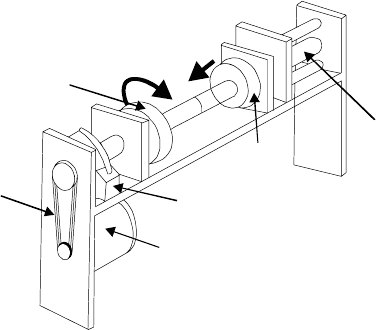
334 Introduction to Basic Manufacturing Processes and Workshop Technology
17.8.1 Forge Welding
In this welding process, the work-pieces to be welded are heated to the plastic condition
(above 1000°C), and then placed together and forged while hot by applying force. Force may
be applied by hammering, rolling, drawing or squeezing to achieve the forging action. Forge
welding was originally the first process of welding. In this process the two metal pieces to be
joined are heated in a forge or furnace to a plait condition and then they are united by
pressure. The ends to be joined are heated in a furnace to plastic condition and formed to
the required shape by upsetting. Then they are brought together and hammered, so as to get
the finished joint similarly, a butt joint can be prepared by forge welding as shown in Fig.
17.3. Before joining the two pieces, their ends are formed to the required shape according to
the type of joint. The forge welding is a manual process and is limited to light work because
all forming and welding are done with a hand sledge. It is a slow process and there is
considerable danger of an oxide scale forming on tile surfaces. The tendency to oxidize can
be counteracted somewhat by using a thick fuel bed and by covering the surfaces with a
fluxing material, which dissolves the oxides. Borax in combination with salt ammoniac is
commonly used as flux. The forge welding is recommended to such metals, which have a large
welding temperature range like low carbon steel and wrought iron. By the increase of carbon
content, this range decreases rapidly. High carbon steels alloy steels require considerably
more care in controlling temperature and producing the welds. Large work may be welded
in hammer forges driven by steam. Welded steel pipe is made mechanically by running the
preheated strips through rolls, which form the pipe to size and apply the necessary pressure
for the weld.
17.8.2 Friction Welding
In this process, the heat for welding is obtained from mechanically induced sliding motion
between rubbing surfaces of work-pieces as shown in Fig. 17.27. In friction welding, one part
is firmly held while the other (usually cylindrical) is rotated under simultaneous application
of axial pressure. As these parts are brought to rub against each other under pressure, they
get heated due to friction. When the desired forging temperature is attained, the rotation is
stopped and the axial pressure is increased to obtain forging action and hence welded joint.
Most of the metals and their dissimilar combinations such as aluminium and titanium, copper
and steel, aluminium and steel etc. can be welded using friction welding.
Rotatin
g
chuck
Slidin
g
chuck
Thrust
c
y
linder
Brake
Motor
Belt
Fig. 17.27 Friction welding process
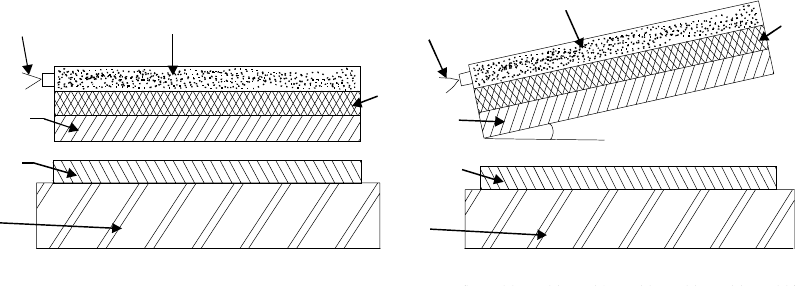
Welding 335
17.8.3 Explosive Welding
In explosive welding, strong metallurgical bonds can be produced between metal combinations
which cannot be welded by other methods or processes. For example, tantalum can be
explosively welded to steel although the welding point of tantalum is higher than the
vaporization temperature of steel. Explosive welding process is shown in Fig. 17.28. It is
carried out by bringing together properly paired metal surfaces with high relative velocity at
a high pressure and a proper orientation to each other so that a large amount of plastic
interaction occurs between the surfaces. The work piece, held fixed is called the target plate
and the other called flyer plate. While a variety of procedures have been successfully employed,
the main techniques of explosive welding can be divided into contact techniques and impact
techniques. In critical space and nuclear application, explosive welding permits fabrication of
structures that cannot be made by any other means and, in some commercial applications,
explosive joining is the least costly method. The main advantage of explosive welding includes
the simplicity of the process, and the extremely large surface that can be welded. Incompatible
materials can also be bonded, and thin foils can be bonded to heavier plates.
Detonator
Explosive
Flyer
plate
Tar
g
et
plate
Anvil
Buffer
plate
Detonator
Explosive
Flyer
plate
Tar
g
et
plate
Anvil
Buffer
plate
α
(a) Parallel Stand Off
(b) An
g
ular Stand Off
Fig. 17.28 Explosive welding process
17.9 THERMIT WELDING
It may be of forge or fusion kind of welding. Fusion welding requires no pressure. Thermit
welding process is depicted in Fig. 17.29. It is a process which uses a mixture of iron oxide
and granular aluminium. This mixture in superheat liquid state is poured around the parts
to be joined. The joint is equipped with the refractory mold structure all around. In case of
thermit pressure welding, only the heat of thermit reaction is utilized to bring the surface
of metal to be welded in plastic state and pressure is the applied to complete the weld. The
temperature produced in the thermit reaction is of the order of 3000°C. Thermit welding is
used for welding pipes, cables, conductors, shafts, and broken machinery frames, rails and
repair of large gear tooth.
17.10 RADIANT ENERGY WELDING PROCESSES
In radiant energy welding processes, heat is produced at the point of welding when a stream
of electrons or a beam of electro-magnetic radiations strikes on the workpiece. This welding
can be carried out in vacuum or at low pressures. Electron beam welding (EBW) and laser
welding are two main types of radiant energy welding processes.
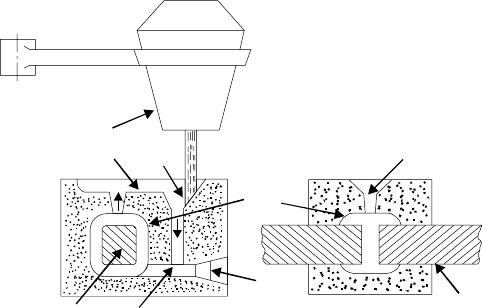
336 Introduction to Basic Manufacturing Processes and Workshop Technology
1
23
4
5
6
7
8
7
8Al + 3Fe O = 4Al O + 9Fe
34 23
1. Crucible,
2. Sla
g
basin,
3. Runner,
4. Wax pattern,
5. Sand plu
g
,
6. Preheatin
g
,
7. Workpiece,
8. Riser.
Fig. 17.29 Thermit welding process
17.10.1 Electron Beam Weldinig (EBW)
In EBW process, the heat is generated when the electron beam impinges on work piece. As
the high velocity electron beam strikes the surfaces to be welded, their kinetic energy
changes to thermal energy and hence causes the workpiece metal to melt and fuse.
A schematic setup of the electron beam welding is shown in Fig. 17.30. This process
employs an electron gun in which the cathode in form of hot filament of tungsten or tantalum
is the source of a stream of electrons. The electrons emitted from filament by thermionic
emission are accelerated to a high velocity to the anode because of the large potential
difference that exists between them. The potential differences that are used are of the order
of 30 kV to 175 kV. The higher the potential difference, higher would be the acceleration. The
current levels are low ranging between 50 mA to 1000 mA. The electron beam is focused by
a magnetic lens system on the workpieces to be welded. The depth of penetration of the weld
depends on the electron speed which in turn is dependent upon the accelerating voltage.
When the high velocity electron beam strikes the work-piece all the kinetic energy is converted
to heat. As these electrons penetrate the metal, the material that is directly in the path is
melted which when solidifies form the joint. Electron beam welding has several advantages
which may not be found in other welding processes. The penetration of the beam is high. The
depth to width ratios lies between 10:1 to 30:1 can be easily realized with electron beam
welding. It is also possible to closely control this penetration by controlling the accelerating
voltage, beam current, and beam focus. The process can be used at higher welding speeds
typically between 125 and 200 mm/sec. No filler metal or flux needs to be used in this process.
The heat liberated is low and also is in a narrow zone, thus the heat affected zone is minimal
as well as weld distortions are virtually eliminated. It is possible to carry out the electron
beam welding in open atmosphere. For welding in vacuum, the work-piece is enclosed in a
box in which the vacuum is created. When electron beam moves in the normal atmosphere,
the electrons would be impinging with the gas molecules in the atmosphere and would thus
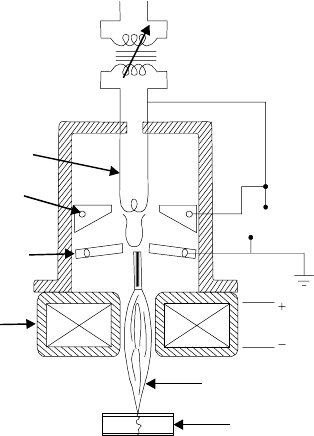
Welding 337
be scattered. This scattering increases the spot size of the electron beam and consequently
there is lower penetration. As the vacuum increases, the scattering effect of the electron
beam decreases and hence, penetration increases. The other advantage of using vacuum is
that the weld metal is not contaminated.
Tun
g
usten
filament
Cathode
Anode
Focus coil
Hi
g
h
volta
g
e
Electron beam
Work piece
Fig. 17.30 Electron beam welding set up
The EBW process is mainly used for welding of reactive metals (nuclear reactor
components), titanium, zirconium, stainless steel, etc. for aero-space and automotive industries.
17.11 EFFECTS OF WELDING HEAT
During the process of welding, the metal is heated over a range of temperature up to fusion
and then allowed to cool. Heating and cooling causes metallurgical and mechanical effects on
the metal pieces being welded. The region of the base metal which is affected by metallurgical
change due to the welding heat is called the heat affected zone. In this zone, the metal has
been heated and cooled through a range of temperature great enough to cause changes in the
structure of the metal. The amount of change may be controlled by using the suitable welding
processes. Sometimes, the original properties may be restored by heat treatment after welding.
Although the mechanical strength of weld metals is at least equal to that of the base metal
but the metallurgical changes can reduce greatly the associated properties of the joint
particularly for shock and fatigue.
Mechanical effects of welding heat are the distortion and the residual stress resulting
from welding. The magnitude of these effects depends on the factors of design and welding
procedure. But the effects will always be present to a certain extent in any structure fabricated
or repaired by non-pressure welding. Because of expansion and contraction of the heated
portion the distortion and residual stresses set up. The base metal heated locally will expand
and up set owing to the restraint imposed by tile surrounding cold metal. This upset portion
of the base metal will contract on cooling beyond its original dimensions and thereby setup
internal stresses causing distortion. If the pieces being welded are not tree to move, high
residual stresses will be formed which may cause cracking during welding.
